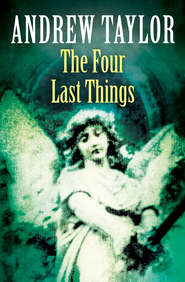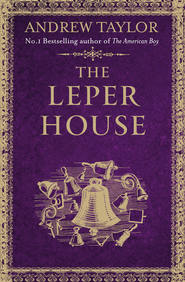По всем вопросам обращайтесь на: info@litportal.ru
(©) 2003-2024.
✖
The Silent Boy
Автор
Год написания книги
2018
Настройки чтения
Размер шрифта
Высота строк
Поля
‘Ah well,’ said Mr Roach. He squinted up at the sky. ‘We better get you up to Charnwood, sir, before it starts raining again.’
Twenty minutes later, a boy led out a small, sad pony attached to a two-wheeled vehicle that was the next best thing to a cart. Savill scrambled up to the seat beside Mr Roach. In the interim, they had become the focus of attention for a small but growing crowd that watched their every move with great interest. Some of the younger ones followed the chaise. Their comments floated up to him like a chorus of Somersetshire voices commenting on the action of a Greek tragedy.
‘Looks a cross one, don’t he? … Wish I’d seen him rolling in the mud … That bull wouldn’t hurt a fly. Reckon he’s scared of cows.’
As the road left the village, it turned and climbed. One by one, the followers dropped away.
‘Who is the lady, by the by?’ Savill said. ‘I didn’t catch her name.’
‘Vicar’s daughter, sir; Miss Horton.’ Mr Roach pointed to the right with his whip. ‘See that, sir? That’s Norbury Park. She’ll have been on her way home from there.’
In the distance, partly concealed in a fold of the hills, was a plain stone house of some size. Savill dredged a name from his memory. ‘Mrs West’s house?’
‘Yes, sir.’
‘Hardly the weather for a lady to walk out in.’
‘Lord bless you, sir, Miss Harriet don’t mind a bit of rain, no more than a duck does.’
They pulled up in front of a pair of gates set in a wall with a small cottage beside them. Mr Roach leaned out of the cart, rattled his whip on the bars of the gates, and shouted: ‘Hey, there!’ in a voice that was possibly audible in the village.
‘Deaf,’ he explained to Savill, lowering his voice to a normal volume. ‘I don’t know why Mrs West lets her stay there. The lady’s too soft-hearted, and that’s a fact.’
An old woman shuffled out of the cottage.
‘Good afternoon, Mrs White,’ Mr Roach shouted. ‘How’s your boy doing in the Dragoons? Keeping well, I hope?’
She appeared not to hear him.
‘Leave the gates open, will you? I shan’t be long.’ Mr Roach dropped a copper into Mrs White’s outstretched hand before passing into the drive. She nodded to him. She paid no attention whatsoever to Savill.
‘Poor woman,’ Mr Roach said to Savill as they rattled slowly up the drive. ‘Lost her husband last winter, one son went off to be a soldier and the other one fell under a wagon when he was drunk. Grandson works in the gardens here but he’s always in mischief. Maybe the good Lord knows what He’s about, but damned if I do.’
The light was already fading from the sky. Dead leaves on the ground muffled the sound of their wheels. The drive sloped steadily downwards.
‘Gloomy old place, eh, sir?’ Mr Roach said. ‘Wouldn’t want to live here myself. Dreadful damp. That’s why Mr West built the new house higher up on the other side of the valley.’ He grinned. ‘Still – better than living in France or heathen parts like that.’
Savill’s discomfort was steadily increasing. His clothes were soaked through. He had missed his dinner and he was ravenously hungry. Worst of all was the damage to his pride: he was aware how forlorn he must look. His arrival in this wretched chaise would hardly improve matters.
‘Sorry about the bumps, sir,’ Mr Roach said. ‘The back drive is even worse. That’s the one I generally use. But I reckon having you here turns this into a gentleman’s chaise.’
He burst out laughing. Savill bared his teeth in what he hoped might resemble an answering smile. The drive followed a bend and suddenly reached its destination. Now they were clear of the protection of the overhanging trees, Savill became aware of how hard the rain was falling.
‘Well, this is it, sir,’ Mr Roach said, raising his whip in a sort of salute. ‘Charnwood. Not to everyone’s taste, perhaps, but you know what the sailors say: any port in a storm.’
Chapter Thirteen (#ulink_d71d60aa-9805-5b37-8a07-5a281d3d7ff0)
It is growing dark when Charles is summoned. Mrs Cox sends a maid to tell him that he must go at once to the library.
Monsieur de Quillon is seated in his armchair, his legs wide, stretched towards the fire. Dr Gohlis is in the shadows, idly turning a great globe that stands in the corner.
The Count beckons Charles towards him. ‘What’s this I hear?’ he says in his deep, hoarse voice. ‘You’ve fouled your bed again? It won’t do, do you hear? Not for someone like you.’
Charles wonders whether it would be different if he were like someone else.
‘I was going to have them thrash the nonsense out of you. But the doctor suggests we give you a chance to make amends.’
Charles glances at Dr Gohlis. He is surprised, and made wary, by the kindness.
The Count massages his temples with his fingers. ‘So if you start talking again, we’ll say no more about it. You won’t be beaten. The matter will be closed.’ He looks directly at Charles and says, almost as if they were equals, one man to another: ‘Well? What do you think?’
Charles would like to say, ‘Thank you, sir,’ but he can say nothing. He does not even bow.
The Count sighs and throws himself back in his chair.
‘It’s merely a matter of will,’ the doctor says, abandoning the revolving world and coming toward the fireplace. ‘There’s nothing wrong with you, my boy. Nothing at all.’ He takes Charles’s chin and tilts it so Charles is forced to look directly up at him. ‘Open your mouth.’
Dr Gohlis prods Charles’s lips with his forefinger, forcing the mouth open. He pushes the lower jaw further down.
‘You see, my lord,’ he says, looking from Charles to Monsieur de Quillon, ‘the tongue, the vocal cords – everything is there for the production of speech, nothing is damaged.’ He releases Charles’s chin. ‘I am demonstrating to him that there is absolutely no medical reason why he cannot speak. The argument is addressed to his intellect – for, though he is still young, he has a rudimentary rational faculty, and we must make this our ally.’
‘I dare say, Doctor.’ Monsieur de Quillon takes up a paper from the table beside him. ‘But I don’t want to hear your lecture on the subject. Get on with it, man, will you?’
Charles glimpses a flicker of anger in the doctor’s face as the Count bends his great head over the paper. He is surprised to find himself entertaining the notion that grown-ups can like or dislike other grown-ups.
Gohlis brings his head down to Charles’s. ‘No one likes pain, do they, my boy? It is abhorrent to any rational being. And you, being human, are capable of reason, capax rationis. You will have enough Latinity for that. In other words, to put it as plainly as I can, this means that, if you have any choice in the matter, you will strive to avoid pain.’
Charles stares at the globe, which is no longer turning. He hears the rustle of paper and Monsieur de Quillon’s laboured breathing.
‘I intend to beat you for fouling your bed like a baby,’ Dr Gohlis says. ‘Unless – and listen carefully now – unless you say to Monsieur de Quillon, “I ask your pardon, monseigneur.”’
The words float into the air. There are black, buzzing insects, swirling, darting, following their own secret paths.
‘That is the rational thing to do, Charles. Your intellect knows that pain is not agreeable, and that it should be avoided if at all possible. You may do this very easily, simply by saying five words.’
Charles has not wronged Monsieur de Quillon. Or Dr Gohlis. He has wronged no one except perhaps the maid who changed his bed, the old woman who will wash his sheet, and the red-headed gardener’s boy who leads the donkey and the laundry cart up and down the back drive. But they would do all these things in any case; they are paid to do these tasks, so he cannot be said to have wronged even them.
‘You must understand what I am saying. I have already demonstrated to you that there is no reason, no physiological reason, for your silence.’
Surely you cannot apologize for something that does not deserve an apology to someone whom you have not harmed? It is not a rational thing to do. Why does the doctor not see that? Perhaps it is the doctor who is not a rational being.
‘Remember, my boy – you are capax rationis.’
Charles knows what the phrase means because the Abbé Viré, the priest who used to give him lessons, explained it to him long ago before he lost his wits. Man is a reasoning being, the old man told him, and that is why Charles is obliged to love God. Reason offers no other choice.
‘Will you speak?’ Dr Gohlis asks. ‘Will you?’
Charles says nothing.











